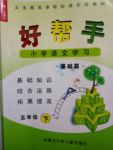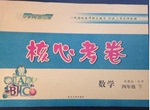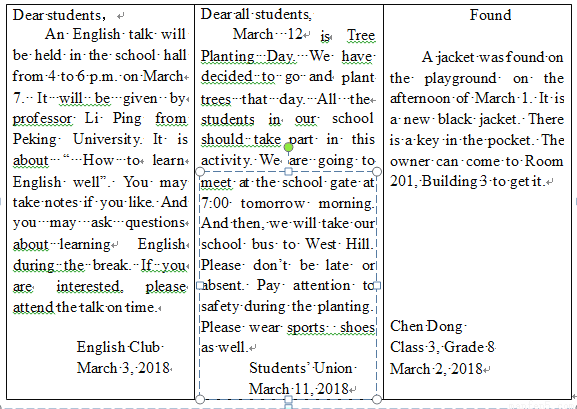��Ŀ����
Carol��s uncle has ______ egg and some bread for his breakfast every morning.
A. a
B. an
C. the
D. /
 B
��������
���⡰����������ÿ����ͳ�һ��������һЩ����������⿼��ڴʱ�����A. a�����ڴʣ���һ������B.�����ڴʡ�һ����������Ԫ������ǰ��C.the�����ڴʡ����ݾ����֪����ʾ��һ������������eggΪԪ�����ؿ�ͷ����ѡB��
B
��������
���⡰����������ÿ����ͳ�һ��������һЩ����������⿼��ڴʱ�����A. a�����ڴʣ���һ������B.�����ڴʡ�һ����������Ԫ������ǰ��C.the�����ڴʡ����ݾ����֪����ʾ��һ������������eggΪԪ�����ؿ�ͷ����ѡB��
 Сѧѧϰ�ð���ϵ�д�
Сѧѧϰ�ð���ϵ�д� Сѧͬ�����������ܾ�ϵ�д�
Сѧͬ�����������ܾ�ϵ�д�Paper cutting is a traditional Chinese art form which has a long history. The first and earliest paper cutting was ______ in China 1��500 years ago. But this traditional art is at risk of disappearing now. Luckily��Voyo Woo��_____ Chinese immigrant(����) in America��is trying to bring this art back to life.
One Saturday in 2014��Ms. Woo held a paper cutting show at a shopping center in Washington. She got much fun ______ it. She hoped more people would enjoy it.
Ms. Woo began to study the art of paper cutting as a 14?year?old girl in her hometown in China. She said all the students at school had to learn paper cutting. But she had a deep ______ for it. So her teacher spent more time ______ her after class.______��she won the second prize in a national painting and art competition. Ms. Woo went to America after she finished college in 2008.Soon after that��she _____ part in an activity to promote(����) Chinese paper cutting. And then she was _____ to show the art in many important activities. ��It is important to promote this art to Americans or anyone ____ is interested in it. Maybe it will make this art more popular���� Woo said.
From the art of paper cutting��people can know about Chinese culture better. Ms. Woo uses the art ____ a tool to show Chinese culture to people who know little about it. Chinese art is not only for Chinese��but also for people all over the world.
1.A. invent B. invented C. invents D. inventing
2.A. a B. an C. the D. /
3.A. done B. to do C. doing D. do
4.A. interesting B. happy C. like D. love
5.A. teach B. teaches C. teaching D. to teach
6.A. Later B. After C. Sooner D. Although
7.A. played B. plays C. took D. takes
8.A. lucky B. excited C. happy D. invited
9.A. where B. who C. whose D. which
10.A. of B. for C. as D. like
 1.B
2.A
3.C
4.D
5.C
6.A
7.C
8.D
9.B
10.C
��������
���Ľ��˼�ֽ���й�ӵ���ƾõ���ʷ,����������ȴ��������ʧ��Σ��.�����������й�����Voyo WooΪ��ֽ�ķ������������Լ�Ŭ����
1.���⣺�״κ�����ļ�ֽ��1500��ǰ���й������ġ�A. invent������һ������ʱ̬��B. inv...
1.B
2.A
3.C
4.D
5.C
6.A
7.C
8.D
9.B
10.C
��������
���Ľ��˼�ֽ���й�ӵ���ƾõ���ʷ,����������ȴ��������ʧ��Σ��.�����������й�����Voyo WooΪ��ֽ�ķ������������Լ�Ŭ����
1.���⣺�״κ�����ļ�ֽ��1500��ǰ���й������ġ�A. invent������һ������ʱ̬��B. inv... (2018��ɽ������) _______ popular festival Halloween is in North America!
A. What B. What a
C. How D. How a
 B
��������
���⣺�ڱ�����ʥ����һ����ô�ܻ�ӭ�Ľ��հ��������̾�䡣Ӣ���и�̾����������ʽ��1.what�����ĸ�̾�䣬�乹�ɣ�what+a/an+���ݴ�+�������ʵ���+����+ν��!/ what +���ݴ�+�������ʸ���+����+ν��!/ what +���ݴ�+����������+����+ν��! 2. How�����ĸ�̾�䣬�乹�ɣ�how+���ݴ�/����+����+ν��!����popular festival��...
B
��������
���⣺�ڱ�����ʥ����һ����ô�ܻ�ӭ�Ľ��հ��������̾�䡣Ӣ���и�̾����������ʽ��1.what�����ĸ�̾�䣬�乹�ɣ�what+a/an+���ݴ�+�������ʵ���+����+ν��!/ what +���ݴ�+�������ʸ���+����+ν��!/ what +���ݴ�+����������+����+ν��! 2. How�����ĸ�̾�䣬�乹�ɣ�how+���ݴ�/����+����+ν��!����popular festival��... "Mom, "said Trevor, as he watched his mother washing the old cans (��), "why are you washing these old cans?"
"I'm getting them ready for being put into the recycling box," said Mom.
"Well, they are rubbish to us, because we don' t need them anymore. I wash the cans out so that they won't attired insects," said Mom. "We don' t use some things, but it doesn't mean they have no value. These cans can be melted (�ۻ�) down to make new cans or other things."
"I didn't think of that," said Trevor. "Is that why you save all the cardboard(ֽ��) or newspapers too?"
Mom nodded, "That is also why I save all those vegetable bits, I use them all in our garden."
"Our teacher told us about projects other classes had done for Earth Day, and she asked for suggestions for our class projects. I can't think of anything. Do you have any good ideas, Mom?" asked Trevor.
Mom wiped (��) her hands with a towel (�) and thought for a few minutes. "I saw an article in a magazine about wise ideas about recycling. It must be something you will be interested in."
1.What was Trevor��s mother doing?
A. She was reading a magazine��
B. She was washing some old cans.
C. She was cooking in the kitchen��
D. She was packing some old newspapers��
2.Trevor's mother saves some things EXCEPT ________ in this passage.
A. cardboard
B. newspapers
C. vegetable bits
D. plastic bags
3.Which of the following is WRONG according to the passage?
A. We can use old cans to make new cans or other things.
B. Trevor's teacher wants to get some suggestions for her class projects.
C. Mom used a towel to dry her hands.
D. We can know the name of the magazine.
4.What will they probably do after the conversation?
A. They will write a new article.
B. They will throw the cans away.
C. They will look for the magazine.
D. They will wash more cans together.
 1.B
2.D
3.D
4.C
��������
��ƪ�����Ѷ����У���Ҫ������������������̸�۹��ڻ������õ����顣
1.ϸ�������⡣����"Mom, "said Trevor, as he watched his mother washing the old cans (��), "why are you washing these old cans?"��֪��������������...
1.B
2.D
3.D
4.C
��������
��ƪ�����Ѷ����У���Ҫ������������������̸�۹��ڻ������õ����顣
1.ϸ�������⡣����"Mom, "said Trevor, as he watched his mother washing the old cans (��), "why are you washing these old cans?"��֪��������������... -- Does Cathy run as _______ as Tina.
-- Yes, she does.
A. faster
B. fastest
C. fast
D. the fastest
 C
��������
���⡰-�����͵����ܵ�һ���죿-�ǵġ������⿼�鸱�ʵ�ԭ���Ƚϡ����ݡ�as+����ԭ��+as����֪����ѡC��
C
��������
���⡰-�����͵����ܵ�һ���죿-�ǵġ������⿼�鸱�ʵ�ԭ���Ƚϡ����ݡ�as+����ԭ��+as����֪����ѡC�� 
�����������ݣ���ѡ�����ѡ����ڴ���Ͻ�ѡ���𰸵���ĸ���Ϳ�ڡ�
1.When will the English talk be held?
A. On March 1. B. On March 7. C. On March 11. D. On March 12.
2.How will the students go to West Hill?
A. By bus B. By ship C. By bike D. By train
3.Where was the jacket found?
A. In the school hall. B. At the school gate.
C. On the playground. D. In Room 201, Building 3.
4.Who found the jacket?
A. Professor Li Ping. B. Chen Dong.
C. A student of the Union. D. A student of the Club.
5.What do we know about the three notices?
A. All students have to attend the English talk.
B. Eglish Club organizes the tree planting activity.
C. Apair of sports shoes was found on the school bus.
D. Chen Dong is a students in Class 3, Grade 8.
 1.B
2.A
3.C
4.B
5.D
��������
����Ϊ��ƪ֪ͨ����һƪΪ3��7������4ʱ��6ʱ��ѧУ���þ���Ӣ���ݽ����ڶ�ƪΪֲ���ڣ�����ƪΪ�������¡�
1.ϸ�������⡣������Ŀ�ؼ��ʡ�English talk����λ�ڵ�һ����ĵ�һ�仰����֪3��7�վ��У���ѡ B��
2.ϸ�������⡣������Ŀ��How����֪�ʵ��Ƿ�ʽ���ؼ��ʡ�West Hill����λ...
1.B
2.A
3.C
4.B
5.D
��������
����Ϊ��ƪ֪ͨ����һƪΪ3��7������4ʱ��6ʱ��ѧУ���þ���Ӣ���ݽ����ڶ�ƪΪֲ���ڣ�����ƪΪ�������¡�
1.ϸ�������⡣������Ŀ�ؼ��ʡ�English talk����λ�ڵ�һ����ĵ�һ�仰����֪3��7�վ��У���ѡ B��
2.ϸ�������⡣������Ŀ��How����֪�ʵ��Ƿ�ʽ���ؼ��ʡ�West Hill����λ... the map and tell me where Shanghai is.
A. Look around B. Look like C. Look at D. Look out
 C
��������
���⣺����ͼ���������Ϻ���������⿼����Ƕ��ʶ��������A. look around�����ܿ���B. look like��������C. look at����ij����D. look out���⿴�����ݾ��⣺���ŵ�ͼ��Ȼ��������Ϻ��������ѡC��
C
��������
���⣺����ͼ���������Ϻ���������⿼����Ƕ��ʶ��������A. look around�����ܿ���B. look like��������C. look at����ij����D. look out���⿴�����ݾ��⣺���ŵ�ͼ��Ȼ��������Ϻ��������ѡC�� It happened to be very cold____ the morning of our sports meeting.
A. at B. on C. with D. of
 B
��������
���⣺�����˶���������糿���ɺ��䡣�����ʱ����⡣in��ָһ����������硢����������Լ��»���Ƚϳ���ʱ�䣻on��ʾ���ڼ���ijһ�ض������ڣ�at��ʾʱ���ijһ�㡢ijһʱ�̻�����ȡ�of��withͨ������ʾʱ�䡣the morning of our sports meeting���ǵ��˶���������糿������ijһ����糿���ý��on�����ݾ����ᄈ����֪ѡB��
B
��������
���⣺�����˶���������糿���ɺ��䡣�����ʱ����⡣in��ָһ����������硢����������Լ��»���Ƚϳ���ʱ�䣻on��ʾ���ڼ���ijһ�ض������ڣ�at��ʾʱ���ijһ�㡢ijһʱ�̻�����ȡ�of��withͨ������ʾʱ�䡣the morning of our sports meeting���ǵ��˶���������糿������ijһ����糿���ý��on�����ݾ����ᄈ����֪ѡB�� ��Do these elephants live in _______?
��Yes. The _______ people like them very much.
A. African; Africa B. Africa; Africa C. Africa; African D. African; African
 C
��������
���⣺������Щ���������ڷ����𣿡����ǵģ������˷dz�ϲ�����ǡ��������ʱ��������ݴʱ�������һ���գ����ݾ�����Щ���������ڷ�����live in����ס�������ij�أ�����ص����ʣ������ޡ�Africa�����ʣ��ڶ����գ����ݾ�������˷dz�ϲ�����ǣ������people�����ʣ�����ǰ��Ӧ�����ݴʡ����ġ�African���ʴ�ѡC��
C
��������
���⣺������Щ���������ڷ����𣿡����ǵģ������˷dz�ϲ�����ǡ��������ʱ��������ݴʱ�������һ���գ����ݾ�����Щ���������ڷ�����live in����ס�������ij�أ�����ص����ʣ������ޡ�Africa�����ʣ��ڶ����գ����ݾ�������˷dz�ϲ�����ǣ������people�����ʣ�����ǰ��Ӧ�����ݴʡ����ġ�African���ʴ�ѡC�� 
